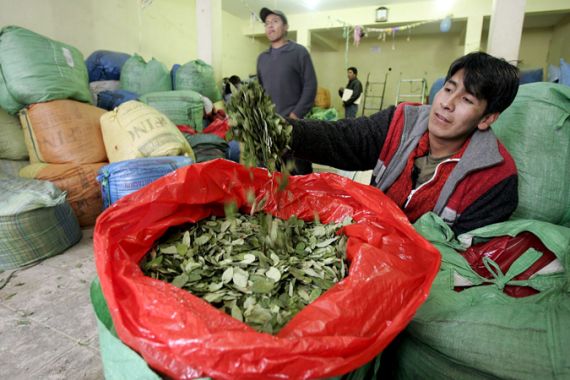Bolivia president defends right to chew coca
Evo Morales says Bolivians have “ancestral right” to chew leaf that makes up the main ingredient of cocaine.

 |
| Coca leaf was declared an illegal narcotic in the 1961 UN Single Convention on Narcotic Drugs [Reuters] |
Bolivian President Evo Morales has defended Bolivians’ right to chew coca leaves, the main ingredient of cocaine, saying it was an ancient tradition and that the world’s third-largest cocaine producer was working to fight drug trafficking.
Holding up a coca leaf to help underline his message at a United Nations anti-drugs meeting in Vienna on Monday, Morales, a former coca leaf farmer, said coca leaf producers were not “drug dealers” and it was not the same as cocaine.
The coca leaf was declared an illegal narcotic in the 1961 UN Single Convention on Narcotic Drugs, along with cocaine, heroin, opium and morphine and a host of chemical drugs.
|
“We are not drug addicts when we consume the coca leaf. The coca leaf is not cocaine “ – Bolivian President Evo Morales |
Bolivia has withdrawn from the convention but hopes to re-join with a reservation recognizing coca chewing.
It is unclear, however, whether it will secure sufficient support among other countries to be able to do that.
“We know that some countries already conveyed to us their strong opposition,” Yury Fedotov, head of the UN Office on Drugs and Crime, told a news conference.
Fedotov expressed concern that this kind of request from Bolivia, in the long run, could undermine international law in the area of drugs control and could have a “domino effect”.
‘Ancestral right’
Morales said that chewing coca leaves was an “ancestral right” for Bolivians.
“We are not drug addicts when we consume the coca leaf. The coca leaf is not cocaine, we have to get rid of this misconception,” he said in a speech that ended with applause from the hall.
“This is a millennia-old tradition in Bolivia and we would hope that you will understand that coca leaf producers are not
drug dealers.”
Bolivia, the biggest cocaine producer after Peru and Colombia, has been trying to promote coca’s health benefits and develop legal uses for coca leaves.
Bolivians have chewed the leaves for centuries as a mild stimulant that reduces hunger and altitude sickness, and
Morales has asked the UN to decriminalize the traditional practice.
“We are very much aware of the damage that can be done by cocaine and we are working against drug trafficking … but we want the recognition of these ancestral rights,” Morales said.
‘Trans-national threat’
|
“[Bolivia has] failed demonstrably to make sufficient efforts to meet its obligations under international counter-narcotics agreements” – US Bureau of International Narcotics and Law Enforcement Affairs |
The head of Russia’s Federal Drug Control Service, Victor Ivanov, spoke of the need to do “everything we can against legalising drugs,” when asked about his position on Bolivia’s campaign in favour of recognizing coca leaf consumption there.
R Gil Kerlikowske, the director of US National Drug Control Policy, said Washington “steadfastly opposes the legalization of drugs”, in a speech, but did not mention Bolivia.
Earlier, Fedotov said that illegal drugs represented a “trans-national threat of extraordinary proportions” as he opened the week-long Commission on Narcotic Drugs meeting.
Progress on fighting the production of illegal drugs had been limited, he said in a speech.
“Over the last decade, coca cultivation has decreased by one third, opium poppy cultivation has also declined by 15 per cent, while overall opium production is still increasing.”
Bolivia and the United States agreed late last year to patch up their differences and restore full diplomatic ties three
years after President Morales threw out the American ambassador and Drug Enforcement Administration agents.
However, Bolivia said it would not let US anti-drug agents return even as government officials work with Washington on a
plan to fight the narcotics trade.
The US Bureau of International Narcotics and Law Enforcement Affairs this month said Bolivia over the last year
had “failed demonstrably to make sufficient efforts to meet its obligations under international counter-narcotics agreements”.